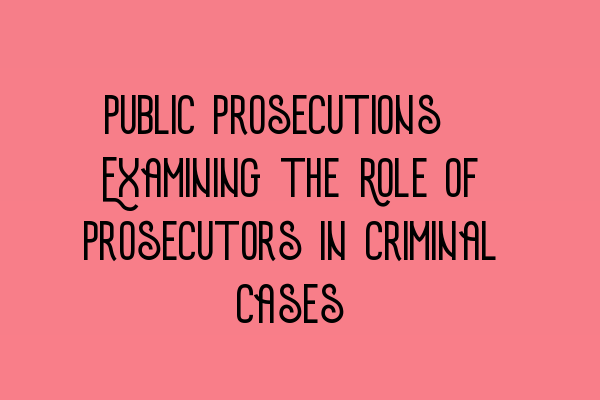Public Prosecutions: Examining the Role of Prosecutors in Criminal Cases
Welcome to the SQE Criminal Law & Practice Law UK blog, where we provide informative content related to criminal law and legal practice. In this article, we will explore the role of prosecutors in criminal cases. Understanding the responsibilities and duties of prosecutors is crucial for aspiring lawyers who aim to specialize in criminal law.
The Role of Prosecutors
Prosecutors play a significant role in the criminal justice system. Their main responsibility is to represent the public interest by presenting evidence and arguing in court for the conviction of individuals accused of committing crimes. The role of prosecutors is multifaceted and involves several key aspects:
- Gathering Evidence: Prosecutors work closely with law enforcement agencies to gather evidence against individuals suspected of committing crimes. This may include interviewing witnesses, examining physical evidence, and analyzing forensic reports.
- Case Preparation: Once sufficient evidence is collected, prosecutors diligently prepare the case for trial. This involves organizing and structuring the evidence, identifying legal issues, and formulating a persuasive legal strategy.
- Courtroom Representation: Prosecutors present the case in court, arguing for the guilt of the accused. They cross-examine witnesses, introduce evidence, and make legal submissions to convince the judge or jury of the defendant’s culpability.
- Ethical Obligations: Prosecutors are bound by ethical rules and obligations. They must ensure a fair trial, disclose any exculpatory evidence to the defense, and uphold the principles of justice. Prosecutors must also exercise discretion in determining whether to pursue charges and negotiate plea bargains.
The Significance of Prosecutors in Criminal Cases
The role of prosecutors in criminal cases cannot be underestimated. They are the primary force behind the prosecution of criminal offenses, working tirelessly to protect society and uphold the rule of law. Prosecutors have a duty to seek justice, ensuring that the guilty are held accountable for their actions while safeguarding the rights of the accused.
Furthermore, prosecutors play a vital role in maintaining public order and safety. Their commitment to prosecuting criminal offenders helps deter potential criminals, thereby contributing to the overall safety and well-being of society.
The Importance of Legal Education and SQE Preparation
Aspiring lawyers who aspire to become skilled prosecutors must undergo comprehensive legal education and training. Preparing for the Solicitors Qualifying Exam (SQE) is a crucial step in this journey. The SQE will assess the knowledge and skills necessary for a successful legal career, including criminal law and practice.
To excel in the SQE, candidates should engage in rigorous preparation. Consider enrolling in SQE 1 Preparation Courses and SQE 2 Preparation Courses to enhance your understanding of criminal law and legal practice. Additionally, practicing with SQE 1 Practice Exam Questions and SQE 1 Practice Mocks FLK1 FLK2 can help you familiarize yourself with the exam format and improve your performance.
Remember to stay updated with the SRA SQE Exam Dates to ensure you stay on track with your preparation and exam schedule.
Thank you for reading this article on the role of prosecutors in criminal cases. Stay tuned for more informative content from SQE Criminal Law & Practice Law UK!
SQE 1 Practice Mocks FLK1 FLK2
